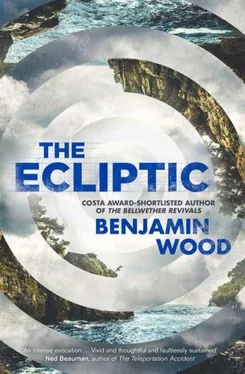‘I knew the boy, Q.’
‘Of course you did, but still I—’
‘No, you’re not hearing me. I knew him.’ I lowered myself to the bed. The linen was fresh and creaseless. ‘Before I got here. I knew him from London.’
‘But he’d have been a kid back then, surely.’
I nodded. ‘He was seven or eight when I saw him last.’
‘I still don’t understand how you can get all that from this .’ Quickman struck the notepad with his knuckles. ‘Unless it’s some sort of code.’
‘It’s not a code. It’s more than that, it’s — something else.’ I had to write it down, to spell it out. ‘Lend me that pad and a pencil, would you?’
Quickman did as I asked. He stood across the bed, head slanted, while I wrote it out in capitals: J O N A T H A N I E L
‘Who’s that?’
‘It’s the name I found on his comics.’
‘Oh.’ He sniffed. ‘Well, I suppose that’s fairly concrete.’
‘It matches the signature on all of the covers,’ I said. ‘So I know that he drew them.’
J O N A T H A N I E L
J O N A T H A N I E L
I turned the paper round. ‘What does that say to you?’
He read it aloud: ‘ Jonathan Ee-ell. Jonathan Ay-ell ?’
‘Could be,’ I said. ‘Or—’
J O N A T H A N Y A I L
‘Now you’ve lost me,’ Quickman said.
‘I’m telling you I knew the boy.’
‘Yes, but you haven’t said how.’
‘You really want my life story, Q? I’m telling you, that was his name.’
‘I don’t doubt it was,’ he said. And he went pacing to the windowsill to retrieve his pipe — the comforter, the thing that made him think clearly. ‘But you’re going to have to give me something more, Knell. I don’t see what difference it makes if you knew him or not.’
‘Because now I can’t ignore it,’ I said. ‘For his father’s sake, I have to do something.’
‘Don’t do anything rash — give it some time.’
‘No, this changes things, Q. It’s bigger than this place. Bigger than you or Mac or anyone else.’
‘You’re going to have to give me more than that. I’m trying my best to understand you here, but—’ He gestured to his desk. ‘Write it down if it’s easier. Just help me understand what’s going on, before you go and do something you’ll regret.’
I told him as much as I was willing to admit — about sailing to New York but not the caldarium; about therapy but not my anxieties; about the mural and the ecliptic but not about Jim Culvers. And Quickman did not judge me. He just chewed on his pipe while I talked and, at the end of it all, he said, ‘I see. All right. I get it.’
‘Then you’ll help me?’
‘I didn’t say that. This isn’t my fight.’
‘But you aren’t going to stop me.’
‘I don’t think I could. You’ve got that look about you.’ He slumped into his desk chair, swivelling. I could see that something was rolling over in his mind that he wanted to release. ‘Did I ever tell you about my old passphrase?’
‘I thought you couldn’t remember it.’
‘Well, I lied.’
‘Why?’
‘I don’t know. I’m superstitious.’ Q pinched at his beard. ‘It’s from a Dickinson poem. One need not be a chamber to be haunted, one need not be a house; the brain has corridors surpassing material place .’
‘That’s beautiful.’
‘It is. But I can never decide what she meant by it.’
‘I suppose she’s saying everyone’s got problems.’
‘But there’s another side to it, don’t you think? She’s saying, no matter where you are, you’re doomed. You can’t close off all those corridors in your brain; there are just too many of them. You’ll be haunted wherever you go.’
‘Maybe.’
He turned to face the window. ‘I’m not going to try to talk you out of anything you need to do, Knell. And I won’t stand in your way. But you have to seriously think about whether it’s all worth it. I mean: consider every angle. If that raging feeling doesn’t go away tomorrow — fine. Do what you think’s best, and don’t worry about the rest of us. We’ll land where we land. All I’m asking is for you to wait awhile.’

The mansion roof was studded with moss and a trench of slimy rainwater ran all along the parapet. I did not venture far. Gripping the tiles, I sidled out until I had a view into the bay, where Fullerton’s body— Jonathan’s body — rested somewhere underneath the roiling waves. The afternoon was no less dismal from this height. A flat discolouration to the sky, like dirty turps, and the air so cut with damp that everything seemed glimpsed through a smeared windowpane. I wanted to follow Quickman’s advice and deliberate on things before I acted. But being on the roof amidst the countless swaying pines, with the nearest family house a mere grey shape in the distance, I could only think how far the boy had come to die. And I could not let the world continue so indifferently.
Because when I thought of Fullerton now, I saw the prom deck of the Queen Elizabeth and a child with a Superman comic, and the sweet ‘Get Well’ card he had drawn for me: Your super friend, Jonathan . Every word that he had spoken in the past few days was loaded with a new significance: those awkward lies about Green Lanes (he could not tell the truth about his upbringing in case it alerted me to his real identity), the talk of his father not taking him camping (Victor was not an outdoorsman), the constant mention of those weekends at his granddad’s flat (Victor being so frequently abroad for conferences, Amanda so routinely at her squash club, that it made sense for the boy to form a bond with the only grandparent he had left). And something about cycling ‘all the way to Hampstead’ one night in his sleep? (The Yails had a home in Primrose Hill, not far from there.)
There were so many inferences that now seemed blatant. Of course, the DV-Ecliptic was an extrapolation of the Queen Elizabeth and other ocean liners the boy had sailed on. Irfan To l likely represented some inherent fear of being alone (given how much time the boy claimed to spend with his granddad, this seemed reasonable to assume). And what were those comics if not just a way to express the terror of his nightmares? The provost had said as much himself: The dreams are part of his creative process. That’s all I can tell you . It was not unfeasible to picture Jonathan reading through his father’s session notes and seeing the ecliptic scribbled down and underlined. Easy to imagine how it might be overheard through the door of the consultation room, or dropped into a no-name-basis conversation at the family dinner table. Perhaps Victor had discussed his patients’ cases brazenly on the telephone with other doctors as the boy listened on the upstairs line — who could say? I had never believed much in coincidence, and it seemed unlikely that the two of us would converge on the same point of fascination without some guiding hand. Now he was gone. And Victor — poor Victor — was out there somewhere, wondering, oblivious. I had to get word to him.
Down on the front lawn, the Frenchman in his yellow poncho was walking in large circles with another guest — I could not see who it was. I had not bothered to study them too closely, but as they started yet another lap, I realised that the other man was not a guest at all. The Frenchman had made a scarecrow out of a broomstick, an old peacoat, and what looked like thatches of dry leaves. He was dancing this strange manikin around the boggy grass as part of some performance. With every circuit, it seemed that he dismantled a piece of the dummy, and, the longer it went on, the more of its guts and fibres lay strewn upon the lawn. He was calling out now in French, but I could not understand what he was saying.
Читать дальше













